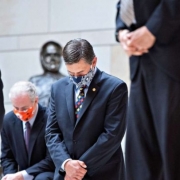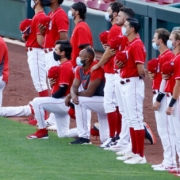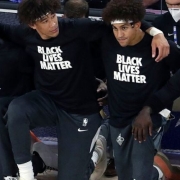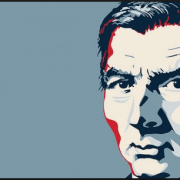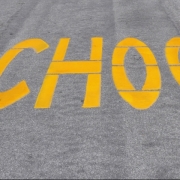There’s a new sin. Forget gluttony. Forget sloth. The great moral error today is whiteness. To be white is to be fallen. Whiteness has become a kind of original sin, an inherited moral defect one must atone for throughout one’s life. In the wake of the brutal execution of George Floyd by police in Minneapolis, this almost religious treatment of whiteness as an existential flaw has gone uber-mainstream.
Listen to the Archbishop of Canterbury. Yesterday he called on ‘white Christians’ to ‘repent of our own prejudices’. Repent, ye sinners! Or if you prefer your leaders to be secular, how about the high priestess of middle-class decency, Nigella Lawson, who instructs her fellow white people to ‘acknowledge [that] systematic racism exists’ and that we are ‘complicit in it’. That brutal killing in Minneapolis – it’s your doing, white people.
Or read Time, the most mainstream magazine in existence. ‘White people’, says one of its contributors, ‘have inherited this house of white supremacy, built by their forebears and willed to them’. Inherited. The sins of the father shall be visited upon the son. The Time writer says white racism is a spectrum, stretching from those white people who tell a black woman ‘how pretty our hair looks when we wear it straight’ to ‘the more extreme end of the spectrum… cops literally suffocating black people like George Floyd as they beg for their lives’.
To compare a compliment about a woman’s hair to the merciless killing of Floyd is deeply disturbing. It sanitizes the crime committed against Floyd and debases his suffering by putting it on a par with a mere uninvited compliment. It also confirms how thoroughly whiteness has been pathologized in mainstream ideology. What was once said about black men – that it is problematic when they compliment women of another race and that their racial make-up drives them towards murderous behavior – is now said about white men. Perhaps someone can explain how replacing one form of racial fatalism with another is progressive.
Whiteness-as-sin is everywhere. ‘White America, if you want to know who’s responsible for racism, look in the mirror’, cries the Chicago Tribune. ‘White people, you are the problem’, it continues, in case you didn’t get its message that this sinful race, these fallen people, are the scourge of our time.
‘I’m talking about white people’, said James Corden in his monologue on The Late Late Show on Monday. ‘This is our problem to solve’, he said of the murder of Floyd and the problem of racism. White people, all of you, you did this. This is how mainstream the pathologization of whiteness has become: it is now beamed into suburban living rooms across the US by famously inoffensive TV hosts. A white man telling white people about the sins of white complicity – this is, at the very least, an extremely odd state of affairs.
Let’s be clear about what is happening here: this is an effort to establish racial collective guilt for the murderous suffocation of George Floyd. There are two problems with this approach. The first is that collective guilt on the basis of racial origin is always a wicked ideology to pursue. Whether it’s Jews being held collectively guilty of the alleged excesses of ‘rich Jews’ or blacks being collectively punished for the offenses of individual black people, such racial extrapolation always leads to prejudice and suffering. There is a twisted irony in the fact that so many commentators and activists who pose as anti-racist are promoting the ideology of collective racial guilt in response to the killing of George Floyd.
The second problem with this sweeping anti-white reaction to Floyd’s death, and with the pathologization of whiteness more broadly, is that it acts as a distraction from the real problems facing the US and other societies. Collectivising the crime committed by four police officers in Minneapolis turns attention away from the specificity of police brutality and of structural disarray in modern America, in favor of pursuing a blanket suspicion of all whites. The problem is dissipated, then obscured. We are implicitly discouraged from seriously analyzing specific residual political problems in the United States in favor of joining in the thrill-inducing project of bashing all whites.
It is important to understand where this distracting moral project comes from. It is an outlook of the privileged elites, very often white elites. It comes from academia, from the media class, from the younger members of the political establishment. For years now, these privileged elites have promoted hostility to whiteness.
They have projected the sins of the past on to whites living today, claiming that white people are the beneficiaries of slavery and colonialism. They have pushed the ideology of ‘white complicity’ (that is, all whites bear responsibility for racial crimes) and ‘white fragility’ (that is, any white who pushes back against this idea of collective racial guilt is showing his moral weakness). They have encouraged the checking of one’s white privilege, which is really a modern form of penance.
Anyone who thought the cranky woke idea of privilege-checking was confined to PC campuses will have had a rude awakening over the past few days. We’ve had the Archbishop of Canterbury promoting a Christian version of white self-correction. And anyone who has seen the incredibly creepy videos showing groups of white people begging black people for forgiveness for the historic crimes of racism or chanting in a massive crowd about how they will do better in future will know that privilege-checking has become the new religion. Original sin, repentance, public self-flagellation – it has it all.
Anti-whiteness comes from the top. It is most pronounced among privileged whites. It has nothing in common with the noble struggles for racial equality in the past. Rather, it expresses the nihilism and fatalism of the contemporary liberal elites and intellectual classes. It is self-loathing disguised as radicalism. It is not the friend, by any stretch of the imagination, of black people or white people. On the contrary, it condemns both to an interminable status quo in which the former must perform the role of perennial victim and the latter must engage in penitence, publicly and noisily, forever. Elite fatalism sees no way out of inequality or injustice, precisely because it has reimagined these things as ‘traits’, as the Chicago Tribune puts it, of racial behavior. All it can envisage is a technocratic system of racial management in which black victims are encouraged to speak and weep and whites are encouraged to listen and repent. Like a forever truth and reconciliation commission.
It is striking that where past black campaigners for racial equality spoke in terms of visions, dreams, better futures in which things would be different, today’s self-styled correctors of white privilege can only obsess over the past. History is their stomping ground. Slavery and colonialism are their obsessions. A writer for Slate says these things are America’s ‘original sin’ and George Floyd’s murder shows that they infect us still. This sums up the fatalism of the new racial guardians. In describing racism as America’s ‘original sin’, they utterly demean the agency of the black people, and white people, who fought for rights and equality over the centuries and who tangibly changed America for the better. Worse, they lock America into racial permanence, into round after round of racial accusation and racial repentance, into a never-ending self-whipping for the inherited sins of the past. It is an entirely dispiriting ideology that offers nothing whatsoever to blacks and whites fighting for freer, better futures.
This is why corporate America and the new political elites have no problem at all with the woke ideology of pathologized whiteness. In fact, they embrace it. In recent days some of the most powerful corporations in the US have commented on the problem of ‘white supremacy’. Leaders and officials in Minneapolis and elsewhere initially refused to condemn rioting on the basis that, as white people, it wasn’t their place to do so. The academia-born new racialism can be easily internalized by the capitalist and political elites because it poses no threat whatsoever to their influence over society. On the contrary, in dissipating the problems of racism and social inequality, in personalizing these things and reducing them to ‘traits’ that exist across the whole of society, the woke ideology takes the heat off the powers-that-be and even creates a space for them to perform their penitence and advertise their awareness and in the process become part of the ‘saved’ people. It empowers them.
This is the great tragedy in the US right now. People are on the streets marching and arguing for some kind of change, but the dominant political ideology and language of our time utterly fails to meet their expectations or even to allow that meaningful change is possible. In accepting today’s ruling-class ideology – the ideology of wokeness and of forever racialism – the leaders of these protests have defeated themselves already. They have embraced an ideology that makes solidarity virtually impossible, by constantly flagging the differential ‘traits’ between blacks and whites, and which elevates backward-looking historic repentance over moving towards a better, wealthier future.
George Floyd’s death has exposed how dominant, destructive and futile the woke worldview has become. Rejecting the new racialism, spurning the woke creed, turning one’s back on elite fatalism that today comes in the garb of caring about black people – these are the preconditions for proper solidarity and real change.
Brendan O’Neill is editor of spiked.

